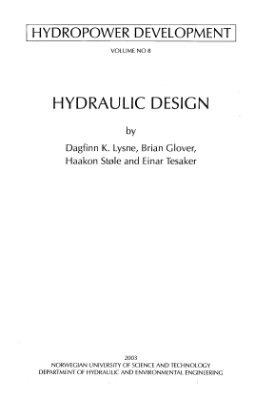By Dagfinn K. Lysne, Brian Glover, Haakon Stole and Einar
Tesaker.
Norwegian Univ. Sci. Techn. 2003 г. , 190 стр.
Each volume of the series deals with a separate topic. The theoretical basis for each topic is set out and followed by a description of how il is applied in each discipline in practice. Each volume is thus a distillation of current thinking and practice within that particular topic or field.
The series is planned so that its volumes can be combined to meet the needs of different groups of readers. It should be noted that most of the content of each volume is original and has not been published before in existing textbooks. This means that when planning a complete course in hydropower engineering, this series will provide a valuable supplement to conventional textbooks.
Therefore, this Volume 8 will not go deeply into the basics of hydraulic theory, but rather assume these to be known by most readers, or to be adequately described in standard text books. For those who wish a better understanding of hydraulic theory, the books in the references are recommended. Nevertheless, for the sake of completeness, a brief introduction in the theory of hydraulic design is given in Chapter 2 and some essential equations are given there, or occasionally in the following chapters.
The aim of the book is rather to give practical guidance on the application of hydraulic theory to the design of hydraulic structures, and to document how hydraulic structures have been designed in the past, particularly in Norway, balancing hydraulics with other design considerations such as cost and safety.
Краткое содержание:
Hydraulic design in hydropower
Theory of hydraulic design
Design strategies for hydraulic structures
Headworks and intakes
Spillway and outlets
Energy dissipation structures
Penstocks and conduits
Tunnel and shaft waterways
Sediment transport and sediment handling
Hydraulic models
Design and construction of spillway and diversion works
Norwegian Univ. Sci. Techn. 2003 г. , 190 стр.
Each volume of the series deals with a separate topic. The theoretical basis for each topic is set out and followed by a description of how il is applied in each discipline in practice. Each volume is thus a distillation of current thinking and practice within that particular topic or field.
The series is planned so that its volumes can be combined to meet the needs of different groups of readers. It should be noted that most of the content of each volume is original and has not been published before in existing textbooks. This means that when planning a complete course in hydropower engineering, this series will provide a valuable supplement to conventional textbooks.
Therefore, this Volume 8 will not go deeply into the basics of hydraulic theory, but rather assume these to be known by most readers, or to be adequately described in standard text books. For those who wish a better understanding of hydraulic theory, the books in the references are recommended. Nevertheless, for the sake of completeness, a brief introduction in the theory of hydraulic design is given in Chapter 2 and some essential equations are given there, or occasionally in the following chapters.
The aim of the book is rather to give practical guidance on the application of hydraulic theory to the design of hydraulic structures, and to document how hydraulic structures have been designed in the past, particularly in Norway, balancing hydraulics with other design considerations such as cost and safety.
Краткое содержание:
Hydraulic design in hydropower
Theory of hydraulic design
Design strategies for hydraulic structures
Headworks and intakes
Spillway and outlets
Energy dissipation structures
Penstocks and conduits
Tunnel and shaft waterways
Sediment transport and sediment handling
Hydraulic models
Design and construction of spillway and diversion works

